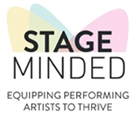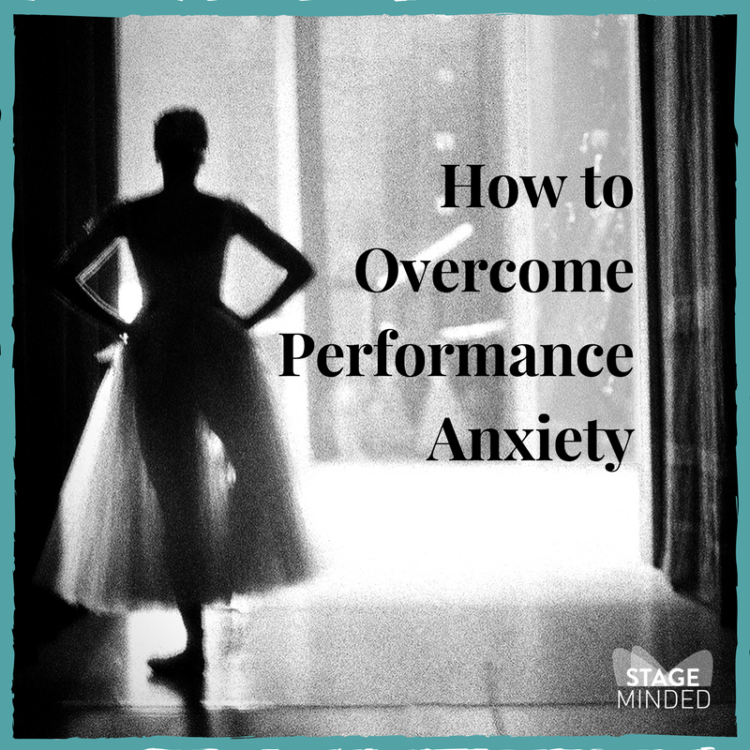How to Overcome Performance Anxiety
Stage-fright, nerves, butterflies… Whatever you call it, performance anxiety impacts most performers at some stage in their training and career.
It starts with “What if’s”
You know that moment when you are side of stage and your tummy turns on you, your breathing starts to flutter and thoughts start to race:
- What if I stuff up?
- What if I make a mistake?
- What if I look stupid?
- What if I’m not as good as the others?
If you don’t intervene and ground yourself now, you can end up convincing yourself that your worst fears are true… and the voice in your head starts to sound more convinced…
- I’m going to stuff up
- I’m going to make a mistake
- I’m going to look stupid
- I’m not as good as the others
So you start drawing conclusions… “If I go on stage, its going to be terrible, I can’t do this… I need to find a way out…”
Now, the human mind can come up with some pretty creative (albeit, not very practical) ideas to handle the situation:
- Maybe biting my nails or grinding my teeth or pacing around restlessly will help
- Maybe, I’ll get annoyed with the stage manager and every other performer backstage around me
- Maybe I can hide in the bathroom and never come out
- Whatever I do, I’m not going on stage
Hmmmn…
Your brain is working against you
If you’ve made it this far, your fight/flight/freeze response has well and truly been activated.
Your amygdala has sent a message to your nervous system that going on stage is a dangerous threat to your survival as a performer…
Your brain has limited bloodflow to your neo-cortex, which unfortunately is a part of your brain that is key to problem solving, being creative and thinking straight – kind of useful things to be able to do if you’re side of stage and need to get yourself together…
Your body is flooded with adrenaline and other stress hormones that can make your performance jittery, tense and less likely to flow smoothly and confidently the way you want to…
So, performance anxiety is a real pain in the butt if you have any desire to perform well on stage!
So, what can you do instead?
How can you get your mind to be more useful to you while you wait in the wings?
So glad you asked 😉
The main mistake I see performers making when it comes to performance anxiety is believing their worries about their performance.
If you want to perform well under pressure, you need to learn to wise up to worries so you don’t just let them take you on their wild-ride of worst case scenarios…
The first step to overcoming performance anxiety is realizing that your brain is catagorising going on stage (or into class, or looking at the mirror, or performing that piece you stuffed up last time… or whatever it is you fear) as if it is a life-threatening danger.
Now, your fight/flight/freeze response is designed for real world dangers (i.e. lions and tigers and bears, oh my…)
And in those sorts of situations, it is REALLY useful for your brain to limit blood to your cortex and pump your blood with energy to fight the beast, run away very fast, or stay really still until the coast is clear…
But when it’s time to perform on stage, you want your full brain functioning…
You want to be energized YES, but you also want to be relaxed enough that your muscles will work smoothly, that you can trust yourself, express yourself, get into flow and perform the way you have practiced.
So, number one when facing stage-fright is to see your worries – not as the gospel truth proving you’re doomed to failure – but just as a sign that your brain has associated going on stage with triggering it’s danger response …and its time to break that association.
When you notice the “what-if’s” firing up and the first little butterflies taking flight in your gut… that’s your cue to remind your brain that the stage is not a lion, nor a tiger, nor a bear, but a space for you to express yourself, stretch yourself and enjoy putting yourself out there.
So, why does performing on stage trigger the danger warning anyway?
The main reason performers I work with tend to have their fight/flight/freeze response initiated when going on stage is because they fear being seen and being judged…
Judgement, failure, disappointment: these are often the trio of beasts performers are most afraid of encountering on stage.
A fixed mindset would have you thinking that your current ability defines you.
…that any mistakes you make, any harsh critiques you receive, any sense of not living up to expectations… that these things are proof that you’re not good enough, that you haven’t got what it takes, that you shouldn’t really be here.
And I know I’ve heard those lies whispered inside my own head in my dancing days… and they will rob you of your joy and your hope and your courage as a performer to be authentically expressive, to step up to the challenge and rise to the occasion.
But the only way to improve as a performer is to PERFORM, to get on stage and give your work-in-progress ability a shot, learn from your mistakes and build your confidence by putting yourself out there.
So, it is really important to remind your brain that being seen as you are (ahem, human) is not a danger and even being judged is something you can handle without having to turn into Chicken Little, if you know who you are and have a strong performance mindset.
But sometimes, all your best efforts to reason with your brain don’t get you anywhere…
And if that’s the case, it’s probably because the worry has gone too far and your brain is already draining blood away from your cortex.
Getting your brain back online to perform at your best
Here is a recipe for getting your cortex back online so you can prepare to perform at your best.
STEP 1: BREATHE
The number one way to communicate with your nervous system that there is no danger, no beast, is to breathe. Slowly and deeply. This is your body’s way of saying, ‘It’s alright, there’s nothing to fear, stop sending stress hormones. It’s just a stage.’
A deep sigh, might be all it takes if you catch your nerves early. If you miss the early cues, it might take a longer series of slow deep breaths or progressive muscle relaxation to get the message across.
But once you’ve caught your breath, you’ll already feel a whole lot more in control.
STEP 2: GROUND YOURSELF
Stage-fright pulls your focus up into your head to whir around with all your panicky thoughts. But if you want to perform well, you need to focus your attention onto your body.
So, feel your feet down into the floor, notice the breadth across your shoulders, find your centre of balance and hone in on your core.
STEP 3: SET YOUR INTENTION
By now, you should be half-way to being able to think straight, so now’s the time to set your intention for HOW you want to perform, how you want to interact with the other performers on stage and the audience out front. Instead of worrying about what you DON’T want to happen, set you intention for what you DO intend to make happen.
Then see that intention play out in your mind, like a movie. Get a clear picture of yourself performing the way you ideally want to in this performance. Visualise yourself calm, confident, enjoying it, expressing freely, adjusting smoothly to any mishaps and trusting your body to do what you have trained it to do.
STEP 4: GET ON THAT STAGE
Now go out there and perform like you intend to… Even if you stuff up, you can learn from this, so don’t be shy, just be yourself and go for it! (…And let me know in the comments how you go!)
🙂 Philippa
If you’d like to learn more tools like this to to help you perform at your best more consistently and confidently, join Mindset School – a give your performance the benefit of a total mindset transformation.


